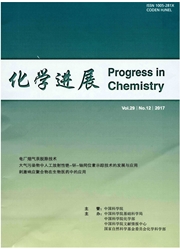

 中文摘要:
中文摘要:
很多抗癌金属药物是以核酸为靶标。阐明小分子与核酸之间的相互作用对筛选具有高效选择性和低毒副作用的抗癌药物有重要意义。近年来,开发新型的具有对核酸序列特异性识别能力的抗癌药物己成为本领域的研究热点。稀土离子具有良好的磁学、光学、电学特性和配位能力,使稀土配合物成为新型药物试剂。然而,稀土离子在中性条件下易水解的特性极大地阻碍了稀土配合物对核酸分子识别的研究。近年来在近生理条件下合成的一系列镧系氨基酸配合物具有结构稳定、溶解性好等优点,解决了镧系离子易水解的问题。本文总结了目前关于镧系氨基酸配合物与核酸的相互作用及其序列选择性等方面的研究进展。
 英文摘要:
英文摘要:
A number of metal-based anticancer drugs are designed to target nucleic acids. Therefore, the elucidation of their interactions with nucleic acids is important for rational design of new anticancer agents with high selectivity and low toxicity, which has been received much attention in this field. Lanthanide complexes have the potential to be therapeutic agents due to their unique magnetic, optical, electronic, and coordinate characteristics. However, lanthanide ions are easy to hydrolysis under physiological pH, which makes it difficult to study rare earth complexes nucleic acids selectivity. Recent studies have shown that natural amino acids can form stable complexes with rare earth ions under near physiological condition and the complexes have high solubility. This review summarizes the current progress in rare earthamino acid complexes binding to nucleic acids and their selectivity.
 同期刊论文项目
同期刊论文项目
 同项目期刊论文
同项目期刊论文
 Ultrasensitive and Selective Detection of a Prognostic Indicator in Early-Stage Cancer Using Graphen
Ultrasensitive and Selective Detection of a Prognostic Indicator in Early-Stage Cancer Using Graphen Easy access to selective binding and recyclable separation of histidine-tagged proteins using Ni2+-d
Easy access to selective binding and recyclable separation of histidine-tagged proteins using Ni2+-d Chiral Metallo-Supramolecular Complexes Selectively Induce Human Telomeric G-Quadruplex Formation un
Chiral Metallo-Supramolecular Complexes Selectively Induce Human Telomeric G-Quadruplex Formation un Metal-mediated fabrication of new functional G-quartet-based supramolecular nanostructure and potent
Metal-mediated fabrication of new functional G-quartet-based supramolecular nanostructure and potent Silver nanoprobe for sensitive and selective colorimetric detection of dopamine via robust Ag-catech
Silver nanoprobe for sensitive and selective colorimetric detection of dopamine via robust Ag-catech A Reusable DNA Single-Walled Carbon-Nanotube-Based Fluorescent Sensor for Highly Sensitive and Selec
A Reusable DNA Single-Walled Carbon-Nanotube-Based Fluorescent Sensor for Highly Sensitive and Selec Multicolor luminescent carbon nanoparticles: Synthesis, supramolecular assembly with porphyrin, intr
Multicolor luminescent carbon nanoparticles: Synthesis, supramolecular assembly with porphyrin, intr A Simple, Universal Colorimetric Assay for Endonuclease/Methyltransferase Activity and Inhibition Ba
A Simple, Universal Colorimetric Assay for Endonuclease/Methyltransferase Activity and Inhibition Ba Sensitive, selective and label-free protein detection using a smart polymeric transducer and aptamer
Sensitive, selective and label-free protein detection using a smart polymeric transducer and aptamer Using Graphene Oxide High Near-Infrared Absorbance for Photothermal Treatment of Alzheimer's Disease
Using Graphene Oxide High Near-Infrared Absorbance for Photothermal Treatment of Alzheimer's Disease Electrochemical DNA three-way junction based sensor for distinguishing chiral metallo-supramolecular
Electrochemical DNA three-way junction based sensor for distinguishing chiral metallo-supramolecular Inhibition of metal-induced amyloid aggregation using light-responsive magnetic nanoparticle prochel
Inhibition of metal-induced amyloid aggregation using light-responsive magnetic nanoparticle prochel Ag Nanoparticles-decorated Graphene Quantum Dots for Label-free, Rapid and Sensitive Detection of Ag
Ag Nanoparticles-decorated Graphene Quantum Dots for Label-free, Rapid and Sensitive Detection of Ag Long-circulating Er3+-doped Yb2O3 up-conversion nanoparticle as an in vivo X-Ray CT imaging contrast
Long-circulating Er3+-doped Yb2O3 up-conversion nanoparticle as an in vivo X-Ray CT imaging contrast Liberation of Copper from Amyloid Plaques: Making a Risk Factor Useful for Alzheimer's Disease Treat
Liberation of Copper from Amyloid Plaques: Making a Risk Factor Useful for Alzheimer's Disease Treat Visual and quantitative detection of copper ions using magnetic silica nanoparticles clicked on mult
Visual and quantitative detection of copper ions using magnetic silica nanoparticles clicked on mult Chiral Metallo–Supramolecular Complexes Selectively Induce Human Telomeric G-Quadruplex Formation un
Chiral Metallo–Supramolecular Complexes Selectively Induce Human Telomeric G-Quadruplex Formation un A Universal, Label-Free, and Sensitive Optical Enzyme-Sensing System for Nuclease and Methyltransfer
A Universal, Label-Free, and Sensitive Optical Enzyme-Sensing System for Nuclease and Methyltransfer (被选为本期扉页) Ultrasensitive and Selective Detection of a Prognostic Indicator in Early-Stage Cancer Usi
(被选为本期扉页) Ultrasensitive and Selective Detection of a Prognostic Indicator in Early-Stage Cancer Usi The use of multifunctional magnetic mesoporous core/shell heteronanostructures in a biomolecule sepa
The use of multifunctional magnetic mesoporous core/shell heteronanostructures in a biomolecule sepa Proton-Fueled DNA Duplex-Based Stimuli-Responsive Reversible Assembly of Single-Walled Carbon Nanotu
Proton-Fueled DNA Duplex-Based Stimuli-Responsive Reversible Assembly of Single-Walled Carbon Nanotu Stabilization of unstable CGC+ triplex DNA by single-walled carbon nanotubes under physiological con
Stabilization of unstable CGC+ triplex DNA by single-walled carbon nanotubes under physiological con Triplex inducer-directed self-assembly of single-walled carbon nanotubes: a triplex DNA-based approa
Triplex inducer-directed self-assembly of single-walled carbon nanotubes: a triplex DNA-based approa A Reusable DNA Single-Walled Carbon Nanotube Based Fluorescent Sensor for Highly Sensitive and Selec
A Reusable DNA Single-Walled Carbon Nanotube Based Fluorescent Sensor for Highly Sensitive and Selec Rapid and ultra-sensitive detection of AMP using a fluorescent and magnetic nano-silica sandwich com
Rapid and ultra-sensitive detection of AMP using a fluorescent and magnetic nano-silica sandwich com Light regulation of peroxidase activity by spiropyran functionalized carbon nanotubes used for label
Light regulation of peroxidase activity by spiropyran functionalized carbon nanotubes used for label Label-Free Colorimetric Detection of Single Nucleotide Polymorphism by Using Single-Walled Carbon Na
Label-Free Colorimetric Detection of Single Nucleotide Polymorphism by Using Single-Walled Carbon Na Selective and quantitative cancer cell detection using target-directed functionalized graphene and i
Selective and quantitative cancer cell detection using target-directed functionalized graphene and i Detection of a Prognostic Indicator in Early-Stage Cancer Using Functionalized Graphene-Based Peptid
Detection of a Prognostic Indicator in Early-Stage Cancer Using Functionalized Graphene-Based Peptid Enzymatic manipulation of DNA-modified gold nanoparticles for screening G-quadruplex ligands and eva
Enzymatic manipulation of DNA-modified gold nanoparticles for screening G-quadruplex ligands and eva Synthesis and Characterization of Red-Luminescent Graphene Oxide Functionalized with Silica-Coated E
Synthesis and Characterization of Red-Luminescent Graphene Oxide Functionalized with Silica-Coated E A graphene functionalized electrochemical aptasensor for selective label-free detection of cancer ce
A graphene functionalized electrochemical aptasensor for selective label-free detection of cancer ce 期刊信息
期刊信息
